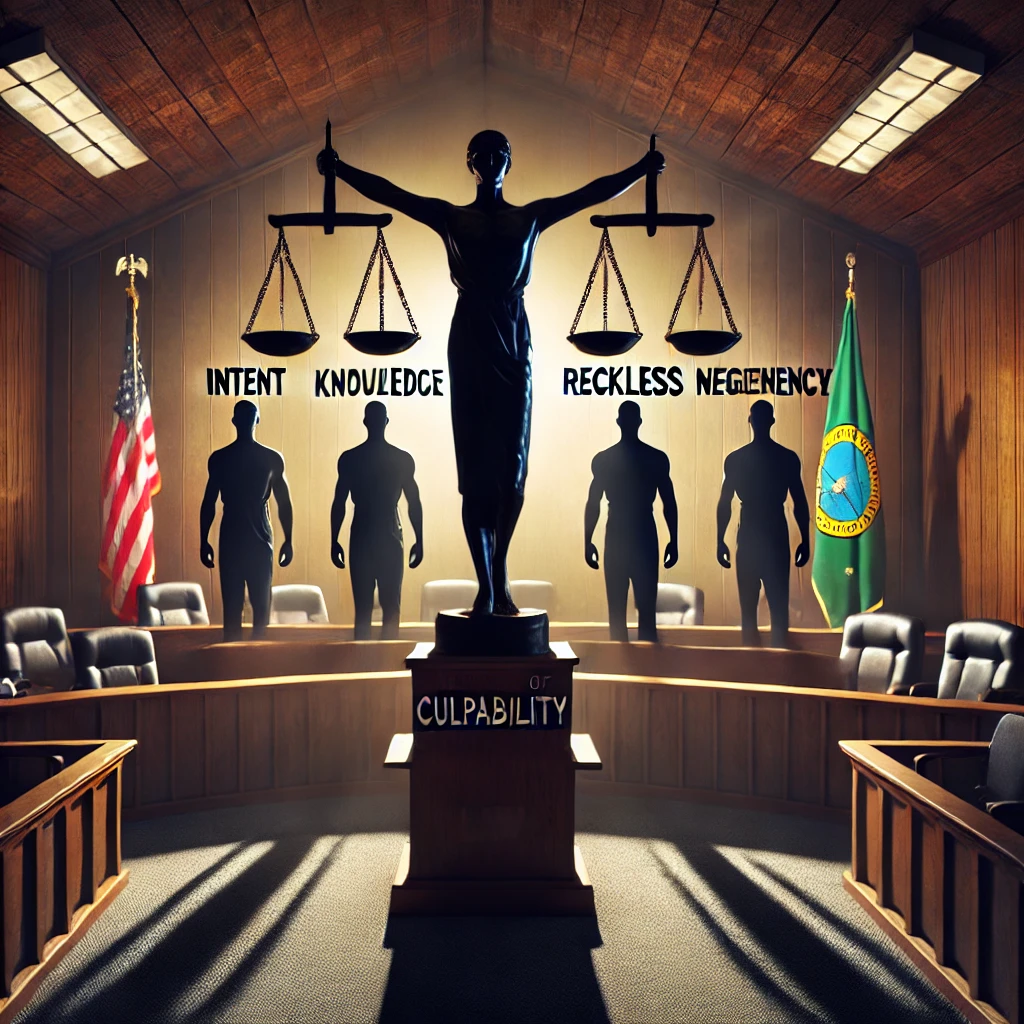Introduction
RCW 9A.08.010 is a Washington State statute that defines the general requirements of culpability in criminal law. This statute outlines the different levels of mental states that can establish criminal liability, including intent, knowledge, recklessness, and criminal negligence. Understanding these definitions is crucial for legal professionals, law enforcement, and the public to comprehend the nuances of criminal responsibility.
Kinds of Culpability Defined
RCW 9A.08.010(1) specifies four kinds of culpability:
Intent
A person acts with intent or intentionally when they act with the objective or purpose to accomplish a result that constitutes a crime.
Knowledge
A person knows or acts knowingly when:
- They are aware of a fact, facts, or circumstances described by a statute defining an offense.
- They have information that would lead a reasonable person to believe that such facts exist.
Recklessness
A person is reckless or acts recklessly when they know of and disregard a substantial risk that a wrongful act may occur, and their disregard is a gross deviation from the conduct of a reasonable person in the same situation.
Criminal Negligence
A person is criminally negligent when they fail to be aware of a substantial risk that a wrongful act may occur, and this failure constitutes a gross deviation from the standard of care a reasonable person would exercise in the same situation.
Substitutes for Criminal Negligence, Recklessness, and Knowledge
RCW 9A.08.010(2) explains that if a statute specifies that criminal negligence suffices for an element of an offense, that element is also established if a person acts intentionally, knowingly, or recklessly. Similarly, recklessness can be substituted by intentional or knowing acts, and knowledge can be substituted by intentional acts.
Culpability as Determinant of Grade of Offense
RCW 9A.08.010(3) states that when the grade or degree of an offense depends on whether it is committed intentionally, knowingly, recklessly, or with criminal negligence, its grade or degree shall be the lowest for which the culpability is established with respect to any material element of the offense.
Requirement of Wilfulness Satisfied by Acting Knowingly
RCW 9A.08.010(4) provides that a requirement for an offense to be committed willfully is satisfied if a person acts knowingly with respect to the material elements of the offense, unless further requirements are plainly stated.
Conclusion
RCW 9A.08.010 provides a comprehensive framework for understanding the mental states that establish criminal culpability. By clearly defining intent, knowledge, recklessness, and criminal negligence, this statute helps ensure that the legal system can accurately assess and assign responsibility for criminal actions. Legal practitioners must be well-versed in these definitions to effectively navigate criminal cases and uphold justice.
You can read the text of RCW 9A.08.010 General requirements of culpability here : https://app.leg.wa.gov/RCW/default.aspx?cite=9A.08.010
For Other Legal Issues, Here Are Some Available Articles:
1. Moving vs. Non-Moving Violations
This article explores the differences between moving and non-moving violations in Washington State, how they affect your driving record, and the penalties involved. Learn which violations can increase insurance rates and result in more severe consequences.
2. Exploring Washington ER 602: The Essential Guide to Personal Knowledge in Court Testimony
A comprehensive guide to ER 602, the Washington rule on personal knowledge in court testimony. Understand the legal requirements for a witness to testify and how the rule impacts the admissibility of evidence in court cases.
3. Navigating RCW 9A.52.080: A Guide to Second-Degree Criminal Trespass in Washington State
An in-depth explanation of RCW 9A.52.080, detailing second-degree criminal trespass in Washington. The article discusses the legal definitions, potential defenses, and consequences of being charged with this offense.
4. The State v. Vela Case, 33 Wn. App. 599 (Wash. Ct. App. 1983): Unpacking Hit-and-Run Laws in WashingtonState
This article analyzes the landmark State v. Vela case and how it helped shape Washington’s hit-and-run laws. It discusses the implications for drivers involved in collisions and the legal repercussions of failing to remain at the scene of an accident.
5. Understanding Negligence in Personal Injury Cases in Washington State
An overview of how negligence is determined in personal injury cases in Washington State. The article outlines the elements needed to establish negligence, the duty of care, and how fault is assessed in car accidents, slip-and-fall incidents, and other injury claims.
Review our client resources here
Contact us anytime for your urgent legal needs.
About Blanford Law:
We are no-nonsense, relentless, fair, and honest. We are great listeners instead of fast talkers, that is just who we are. More than 20 years ago, Ken began practicing law with a deeply-seeded belief that every person has the right to the best legal representation available. He built his law firm on that belief. Another belief that he strongly adheres to is his fundamental belief that clients deserve respect, with no assumptions or preconceived notions. If you or someone you know is accused of a crime or injured as a result of the negligence of another, please have them call us at 253-720-9304 or email us info@blanfordlaw.com

